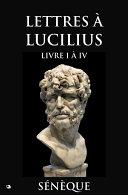Sénèque , né à Corduba, dans le sud de l'Espagne, entre l'an 4 av. J.-C. et l'an 1 apr. J.-C., mort le 12 avril 65 apr. J.-C., est un philosophe de l'école stoïcienne, un dramaturge et un homme d'État romain du Ier siècle. Il est parfois nommé Sénèque le Philosophe, Sénèque le Tragique ou Sénèque le Jeune pour le distinguer de son père, Sénèque l'Ancien.
Conseiller à la cour impériale sous Caligula, exilé à l'avènement de Claude puis rappelé comme précepteur de Néron, Sénèque joue un rôle important de conseiller auprès de ce dernier avant d'être discrédité et acculé au suicide. Ses traités philosophiques comme De la colère, De la vie heureuse ou De la brièveté de la vie, et surtout ses Lettres à Lucilius exposent ses conceptions philosophiques stoïciennes. Pour lui :
« Le souverain bien, c'est une âme qui méprise les événements extérieurs et se réjouit par la vertu. »
Ses tragédies constituent l'un des meilleurs exemples du théâtre tragique latin avec des œuvres qui nourriront le théâtre classique français du XVIIe siècle comme Médée, Œdipe ou Phèdre.
Wikipedia
✵
4 av. J.-C. – 12. avril 65 ap. J.-C.
•
Autres noms
Seneca mladší,
Lucius Annaeus Seneca (Seneca der Jüngere),
Lucius Annaues Seneca,
Луций Анней Сенека


